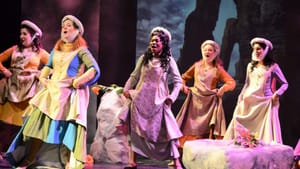Stay in the Loop
BSR publishes on a weekly schedule, with an email newsletter every Wednesday and Thursday morning. There’s no paywall, and subscribing is always free.
A rare favorite
The Academy of Vocal Arts presents Donizetti’s ‘La Favorite’

Donizetti’s La Favorite straddles the line between operatic curiosity and repertory staple. It is well known enough to have spawned several complete recordings, a handful of familiar arias, and a following among certain star singers throughout the decades. Yet complete performances remain relatively rare, especially in its original French version. It took the Academy of Vocal Arts (AVA) 85 years to offer a production. Was it worth the wait?
Certainly—though not without reservations. Although Donizetti was a master of Italian bel canto, this 1840 work is among the grandest of grand opera, and it requires a level of theatricality that even the most polished of conservatories cannot provide. AVA’s resident artists sang with promise and panache, if not always ideal style; the pick-up orchestra played with verve, if not always total coordination. The production itself was occasionally beside the point.
Opera on assignment
Then again, it’s fair to ask how much reasonable coherence one can expect from this opera. Donizetti essentially wrote it on assignment from the Paris Opera, setting an existing libretto by Alphonse Royer and Gustave Vaëz. He buffed up the leading female role, Léonor, to make it a suitable star vehicle for mezzo-soprano Rosine Stoltz, lover at the time of the Paris Opera’s intendant, Léon Pillet. The melodramatic plot centers on the three Rs of grand opera: romance, royalty, and religion.
The postulant Fernand abandons his monastery to pursue an affair with a mysterious woman, who refuses to reveal her true identity even as she conscripts him into the army to fight the Moors. She happens to be Léonor, mistress of King Alphonse of Castile—the “favorite” of the title. When Fernand distinguishes himself in battle, his request for Léonor’s hand sends the drama spiraling into Harlequin romance territory, with expectedly disastrous results. But a lot of fun melodrama, and great music, unfurls along the way.
Focus on the music
AVA’s aesthetic skews traditionalist, and I didn’t expect the production to wrestle with some of the work’s more desultory elements. (Léonor, of course, is expected to bear the brunt of ignominy as a “fallen” woman, while both her lovers escape relatively unscathed.) Yet I hoped for more than what stage director Gregory Boyle delivered, which often looked silly. Peter Harrison’s scenic design utilizes projected images that resemble screensavers; Val J. Starr’s costumes could have been pilfered from Medieval Times. Attempts at staging reach their nadir when the Act II ballet becomes a choreographed dumb show of the opera’s plot—in every sense of the word.
Better to focus on the music. As is frequently the case with conservatories, the production is double-cast. At the second of four performances, Pascale Spinney displayed a silken, dark-hued mezzo as Léonor, and acted the role with clarity and poise. Her moving rendition of “O mon Fernand,” the score’s best-known lament, earned deserved cheers from the capacity crowd.
As Léonor’s royal lover, baritone Daniel Gallegos was vocally stylish and dramatically moving. Brent Michael Smith deployed his sonorous bass with admirable restraint as Balthazar, a senior monk and the opera’s moral authority. Tenor Abraham Bretón made a conniving Don Gaspar, and the big-voiced soprano Yihan Duan was luxuriously cast in the small supporting role of Inès.
Overall, a rewarding listen
Fernand is a perilous role, requiring dulcet singing throughout a long evening and effortlessly produced high notes. Tenor Sahel Salam, in his first year on the AVA roster, supplied an admirable, if not triumphant, performance. He sounded steady and secure when singing in his middle range, producing waves of gleaming tone. But a truly successful Fernand needs a high C and a C-sharp, and those notes just aren’t there yet, despite a wealth of effort on Salem’s part. His acting also varied between ardency and stiffness.
Conductor Richard A. Raub made AVA’s chamber orchestra sound like a band twice its size. This was a blessing and a curse. The effect could be thrilling, as in the propulsive overture. But the music remained fast and fortissimo all night, even in what should have been gentle, introspective moments. Still, some elements were just right—none more so than Sophie Bruno’s elegant harp in “O mon Fernand.”
Donizetti composed an astonishing 73 full-length operas in his relatively short life; many are rarer than La Favorite, while just as many are more commonly programmed. (Perhaps you’ve heard of Lucia di Lammermoor.) Even if AVA’s assumption isn’t perfect, it rewards the curious listener and deserves to be heard.
What, When, Where
La Favorite. By Gaetano Donizetti. Conducted by Richard A. Raub. Directed by Gregory Boyle. Academy of Vocal Arts. Through February 22, 2020, at the Helen Corning Warden Theater, 1920 Spruce Street, Philadelphia. (215) 735-1685 or avaopera.org.
A wheelchair-accessible entrance is located in the rear of the AVA building. Please call (215) 735-1685 in advance of your performance to make arrangements to use this entrance.
Sign up for our newsletter
All of the week's new articles, all in one place. Sign up for the free weekly BSR newsletters, and don't miss a conversation.

 Cameron Kelsall
Cameron Kelsall